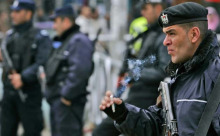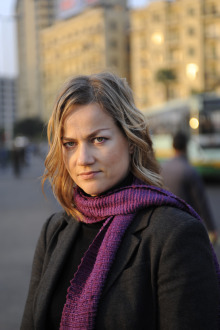Matt Rees's Blog - Posts Tagged "time-magazine"
Inventing the Palestinian detective
 The dead man's mother raged and wept as she told me how she’d discovered her son’s body, in the cabbage patch outside her home. She’d gone down on her knees, she said, touched his blood and wiped her fingers on her face, calling out that God is most great.
The dead man's mother raged and wept as she told me how she’d discovered her son’s body, in the cabbage patch outside her home. She’d gone down on her knees, she said, touched his blood and wiped her fingers on her face, calling out that God is most great.As the winter wind came cold off the Judean Desert, I watched her tears and thought: “I have to write a novel about this.”
Forgive me if that sounds callous, but I’m a writer. Or, I should say, that’s the moment when I became a writer.
I was Time Magazine’s Jerusalem bureau chief, covering the violence of the Palestinian intifada, when I went to that bereaved mother in her village on the edge of Bethlehem in 2002. I had always written fiction, but only published a few short stories. In the midst of the despair that engulfed Israelis and Palestinians, I found the very thing that could make me happy – the material for my series of Palestinian crime novels.
The killing of that woman’s son as he crept home in the dark was the basis for the opening death in my first novel “The Collaborator of Bethlehem.” The book won a Crime Writers Association Dagger. Since then I’ve published two more crime novels set in the Palestinian towns.
They’re a response to the emotional questions that, as a journalist, I was never able to answer. Strangely, fiction proves to be a better way to understand extreme events than journalism.
Since the first time I set foot in the West Bank in 1996, I had grown disillusioned with the ability of journalism to convey the depth of what I learned about the Palestinians. Back then, I visited the family of a Nablus man tortured to death in one of Yasser Arafat’s jails. The news article I wrote was a good one, uncovering the internal Palestinian violence so often overshadowed by the more spectacular conflict with Israel. But my impressions were much deeper.
I was struck by the candor and dignity with which the dead youth’s family spoke to me; the sheer alien nature of the place thrilled me. At the entrance to the family’s house in the casbah, an old oil drum held black flags and palm fronds, symbols of Islamic mourning. Men sat around smoking under a dark awning. I felt a powerful sense of adventure, as though I had uncovered an unknown culture.
The lawlessness of Palestinian life also gave me great characters for my fictionalized good guys. But also the villains. Unfortunately there are many Palestinians who have strong motivations to kill each other. I’ve spent a lot of time over the years with some of these men, trying to learn why they take the path of violence—time that has led to a deeper characterization of the villains in my books.
With my new novel, “The Fourth Assassin,” I brought my sleuth Omar Yussef to New York because I wanted him to confront the most important issue of the last decade – an issue which is crystallized in its most horrifically concrete form in the city of 9/11.
It’s a natural progression for a series that began in the cabbage patch near Bethlehem. When I stood there, it was seven months after the attacks on New York and Washington. The questions posed to anyone thinking about the Middle East had just become so much more complex. Too complex and emotional for journalism to encompass them and, all these years later, for politicians, too.
Whether it’s a single sniper’s bullet cutting through the chest of a man outside his mother’s house or a jetliner bursting through a 110-story building, my novels are aimed at the most explosive points in our recent history. That’s why I simply had to write them.
(I posted this on a joint International Crime Authors blog I write with three other writers. Check it out.)
Published on February 24, 2010 22:49
•
Tags:
9-11, assassination, bethlehem, blog, brooklyn, crime-fiction, journalism, judean-desert, middle-east, new-york, omar-yussef, sniper, the-collaborator-of-bethlehem, the-fourth-assassin, time-magazine, united-nations, washington, west-bank, yasser-arafat
New York Times Book Review: THE FOURTH ASSASSIN 'engrossing,' 'New Yorkers will be startled'
"New Yorkers are bound to be startled by the views of their city advanced by Matt Beynon Rees in THE FOURTH ASSASSIN (Soho). In his new mystery featuring Omar Yussef, a Palestinian who teaches history at a school for girls in Bethlehem, Rees, a former Jerusalem bureau chief for Time magazine, brings his series’s hero to New York for a conference at the United Nations. But first, Yussef visits “Little Palestine,” in the Bay Ridge section of Brooklyn, where his youngest son lives — and stumbles onto the headless corpse of one of his son’s roommates. Over the course of an engrossing investigation conducted by a Palestinian-born New York detective, Yussef is educated in the harsh views of Arabs in some quarters of the city and exposed to the simmering anger of young Arabs like his son. Even more distressing, he sees how his Middle Eastern brethren have brought to America the same animosities that made them bad neighbors back home."
Published on February 26, 2010 22:59
•
Tags:
arab, bay-ridge, brooklyn, crime-fiction, detective-fiction, little-palestine, marilyn-stasio, middle-east, new-york, new-york-times-book-review, omar-yussef, palestine, palestinians, reviews, the-fourth-assassin, the-new-york-times, time-magazine, united-nations
How to keep up on the Middle East
 JERUSALEM — Time was anyone with an interest in the Middle East could be guaranteed a couple of books a year would be brought out by U.S. journalists based in the region. Now many of those correspondents are history, with news bureaus closing and those that remain cutting back. The new books written by Americans tend to be by think-tank types or others whose agenda is hard to figure out.
JERUSALEM — Time was anyone with an interest in the Middle East could be guaranteed a couple of books a year would be brought out by U.S. journalists based in the region. Now many of those correspondents are history, with news bureaus closing and those that remain cutting back. The new books written by Americans tend to be by think-tank types or others whose agenda is hard to figure out.But you know that already. It’s one reason you’re reading GlobalPost, which was founded partially to replace the disappearing corps of U.S. foreign correspondents. [That's where I first posted this.]
So GlobalPost has solved your journalism problem. But, still, what’re you going to do about the books? With a book written by a foreign correspondent you couldn’t always be sure of a good read —I’ve ploughed through some stinky “notebook dumps” in my time by reporters who padded pages with meaningless tales of their Palestinian and Israeli “friends” — but you at least knew that it was by a responsible journalist answerable to editors and readers even for his extracurricular writings. Not so with think-tank academics whose financing and agenda can make for deeply skewed accounts.
The answer: Europeans. A new book demonstrates what I’m talking about.
“Hold onto Your Veil, Fatima!” is an expose of contemporary Egypt that’s at once harrowing and humorous by Sanna Negus, a reporter for Finland’s YLE Radio and TV.
Negus came to the Middle East in the mid-1990s for graduate studies in Cairo, largely because she wanted to learn an unusual language and figured Arabic fit the bill. (It’s not as unusual as Finnish, but then she already had that covered.) She returned to Cairo, working for the English-language Cairo Times and staying for a decade as YLE’s correspondent. She’s been based in Jerusalem the last two years. (Lawrence Wright, who won a Pulitzer for “The Looming Tower: al-Qaeda and the Road to 9/11,” writes in the book’s foreword that Negus is “one of the most informed and well-connected reporters in the region.”)
Read the rest of this post on my blog The Man of Twists and Turns.
Published on June 20, 2010 03:16
•
Tags:
9-11, american-colony, cairo, cairo-times, crime-fiction, egypt, female-circumcision, finland, genital-mutilation, global-post, hold-onto-your-veil-fatima, israe, jerusalem, journalism, lawrence-wright, middle-east, middle-east-books, pulitzer-prize, sanna-negus, the-looming-tower, time-magazine, women



